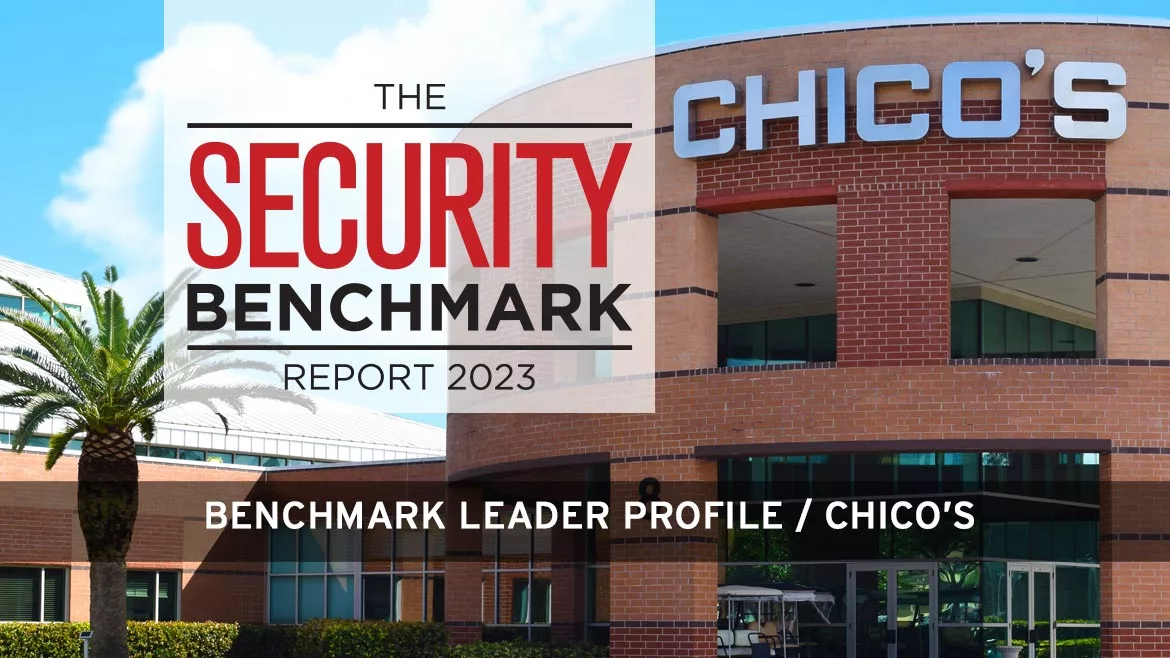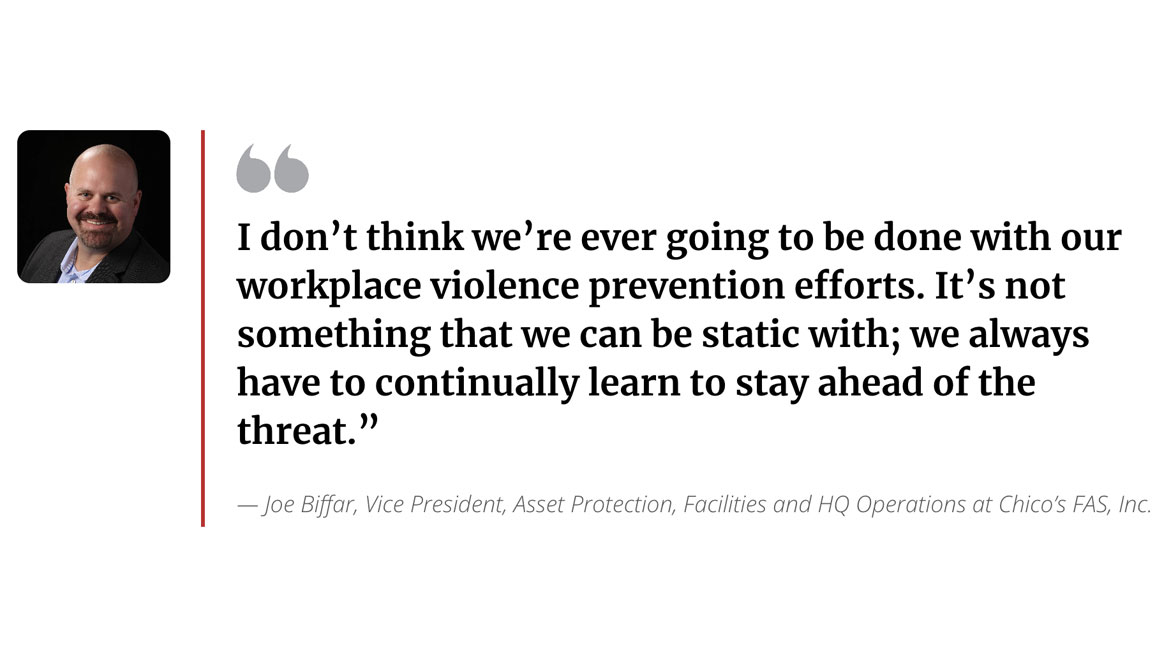Special Report
The 2023 Security Benchmark Leaders — Chico's FAS, Inc.
A Holistic Approach to Corporate Security

HQ image courtesy of Chico's – Joe Biffar bio photo courtesy of Biffar
Crisis management is something every organization — from small businesses to government institutions — will eventually need to take on, and having an effective and well-trained security team is part of the solution. This is no different for Chico’s FAS, Inc. (Chico’s).
Chico’s, a Florida-based fashion company founded in 1983, operates three brands including the namesake Chico’s, White House Black Market and Soma. As of 2023, the company operates 1,258 stores in the U.S. and sells merchandise through its digital channels, 58 international franchise locations in Mexico and two domestic franchise locations in airports.
To maintain an effective security program in an organization that size, it is important to tailor the strategy to fit the location, says Joe Biffar, Vice President, Asset Protection, Facilities and HQ Operations at Chico’s FAS, Inc.
“We have a wide scope of responsibilities and geographic spread, and it can’t necessarily be one-size-fits-all for a retail location versus a distribution center, corporate office or international location,” he says.
WORKPLACE VIOLENCE PREVENTION
Biffar believes the threat of workplace violence has significantly increased for companies operating in the retail space. Workplace violence threats can range from a customer incident at a store, organized retail crime group, or an employee’s personal life impacting the business, such as a domestic violence issue.
To that end, Biffar adds that Chico’s security program is driven by a cross-functional team partnering with Human Resources, Associate Relations and Legal.
“I truly believe this cross-functional partnership is really what makes our program successful,” he says.
With workplace violence, Biffar says people often think when a threat arises, it’s a single incident that needs to be resolved. However, in reality, it’s a progression.
“It’s a continual engagement of our workplace violence prevention team, to protect our associates and manage the threat until it’s gone. That might be a week, a month, a year or longer,” Biffar says. “With proactive threat assessment and management and a robust care team, we’ve been able to address those successfully.”
Prior to 2019, Chico’s had what Biffar would call a fledgling workplace violence protection program. However, that year the company had a real-world, unplanned event that put the program to the test.
“That year was kind of a turning point,” Biffar recalls. “We had a hoax call of an active shooter on our corporate campus which spurned a very large law enforcement response. We learned a lot of key lessons from that. I don’t think we’ll ever be done with our workplace violence prevention efforts. It’s not something that’s static, we must continually learn to stay ahead of the threat.”
HURRICANE IAN
Part of an effective corporate strategy includes emergency preparation and response plans for severe weather, which, for Chico’s, include hurricanes. Biffar says preparedness for the company is a year-long effort, even though hurricane season only runs from June through end of November.
The preparedness strategy included dividing Chico’s geographic footprint into zones so they have quick and concise areas to communicate to and make decisions, whether pre- or post-storm. The company distributes preparedness guides to teams throughout the organization.

“It’s also about engaging with our security partners, outside vendors, facility and emergency response teams in the offseason, to ensure that our agreements are locked in place before the winds start blowing,” Biffar says.
One of the emergency response partnerships Chico’s has is with Florida Power and Light (FPL), one of the largest power providers in the state. The partnership includes FPL utilizing the company’s 58-acre corporate campus in Fort Myers during disaster response.
These plans were put to the test in September 2022 when Hurricane Ian made landfall as a nearly Category 5 Atlantic hurricane and ended up being the deadliest to strike the state of Florida since 1935. In the aftermath of Ian, Biffar says FPL set up at the Chico’s corporate campus to serve the community in a response effort. At the same time, Biffar fielded phone calls from the American Red Cross national headquarters asking to use the corporate site as a disaster response headquarters.
“At its peak, we had about 3,000 line workers, response and aid teams, and Red Cross staff sleeping on our campus, plus all of their vehicles,” Biffar says. “The Red Cross was delivering more than 8,000 hot meals daily to support community recovery and response efforts.”
In addition to assisting FPL and the Red Cross, Biffar’s team’s primary focus in the aftermath was ensuring the safety of staff utilizing the company’s mass notification system and conducting welfare checks across the area impacted by Ian.
“We had our HR and security team standing by to ensure that we quickly addressed unmet needs, whether this was dropping off relief supplies, getting people to shelters, or connecting them with emergency assistance programs,” he says. “Thankfully, associates at Chico’s came together as a family, and we were very quickly able to secure housing for more than 80 associates who had been displaced by the storm.”
Biffar says the response to Hurricane Ian put things in a whole new perspective for him, seeing how the Chico’s family came together to support one another.
“It took just a couple of days to ensure that we had addressed critical needs for our associates, whether it was finding them housing, including people who were in a safe place opening their own homes to associates,” he says. “It was a challenging moment for our community, and I’m proud to be a Chico’s employee.”
STRONG SECURITY POSTURE
Chico’s security operations center (SOC) not only focuses on the physical side, but also digital threat management as well, Biffar says.
“Our robust fraud modeling allows us to quickly identify fraud patterns and mitigate loss,” Biffar says. “As a digital-first company, we use anti-fraud technology, data-driven intelligence and machine learning to support our SOC team's efforts.”
In order to maintain an effective security posture, Biffar emphasizes the importance of breaking down the security silo and looking for development opportunities in areas like leadership and soft skills across the whole organization.
“It's about adding value to the organization through security best practices, explaining the why behind those practices,” he says. “We want to build the awareness that security is everyone's responsibility and by focusing on the basics and empowering our associates, it really allows us to expand the reach of our teams.
Looking for a reprint of this article?
From high-res PDFs to custom plaques, order your copy today!







